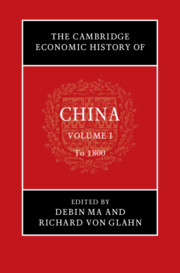Book contents
- The Cambridge Economic History of China
- The Cambridge Economic History of China
- The Cambridge Economic History of China
- Copyright page
- Contents
- Figures
- Maps
- Tables
- Contributors to Volume I
- Acknowledgments
- Note on Citations
- Introduction to Volume I
- Part I Before 1000
- Interlude
- Part II 1000 to 1800
- 7 Ecological Change and Resource Constraints
- 8 Population Change
- 9 Public Finance
- 10 Political Economy
- 11 Law and the Market Economy
- 12 Property Rights and Factor Markets
- 13 The Rural Economy
- 14 Cities and the Urban Economy
- 15 The Monetary System
- 16 Merchants and Commercial Networks
- 17 Foreign Trade
- 18 Production, Consumption, and Living Standards
- Bibliography of Primary Works Cited
- Index
- References
10 - Political Economy
from Part II - 1000 to 1800
Published online by Cambridge University Press: 07 February 2022
- The Cambridge Economic History of China
- The Cambridge Economic History of China
- The Cambridge Economic History of China
- Copyright page
- Contents
- Figures
- Maps
- Tables
- Contributors to Volume I
- Acknowledgments
- Note on Citations
- Introduction to Volume I
- Part I Before 1000
- Interlude
- Part II 1000 to 1800
- 7 Ecological Change and Resource Constraints
- 8 Population Change
- 9 Public Finance
- 10 Political Economy
- 11 Law and the Market Economy
- 12 Property Rights and Factor Markets
- 13 The Rural Economy
- 14 Cities and the Urban Economy
- 15 The Monetary System
- 16 Merchants and Commercial Networks
- 17 Foreign Trade
- 18 Production, Consumption, and Living Standards
- Bibliography of Primary Works Cited
- Index
- References
Summary
“Political economy” is a Western term that carries its own, evolving ideological baggage. For John Stuart Mill, political economy was a science – that which “traces the laws of such of the phenomena of society as arise from the combined operations of mankind for the production of wealth, in so far as those phenomena are not modified by the pursuit of any other object.”1 Adam Smith used the word “science,” but meant what Mill would have called “art”: for him, “political oeconomy” could be “considered as a branch of the science of a statesman or legislator” and had as its objectives “enabl[ing]” the people to prosper through their own efforts and “supply[ing] the state or commonwealth” with means of payment for “the public services.”2 Smith takes us closer than Mill to what the authors mentioned in this chapter understood as their mission. It is not that Chinese writers were incapable of identifying infallibly observed regularities, but construction of a disciplinary edifice through the systematic “tracing” of such regularities in economic behavior was not a premodern Chinese project.
Keywords
- Type
- Chapter
- Information
- The Cambridge Economic History of China , pp. 381 - 418Publisher: Cambridge University PressPrint publication year: 2022

